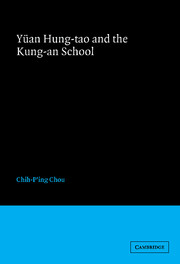Book contents
- Frontmatter
- Contents
- Preface
- 1 The literary scene before the rise of the Kung-an school
- 2 The literary theories of the three Yüan brothers
- 3 The poetry of Yüan Hung-tao
- 4 The prose of Yüan Hung-tao
- Epilogue: the legacy of the Kung-an school
- Notes
- The modern study of the three Yüan brothers and their Kung-an school: an introduction and select bibliography
- Chinese titles of works translated in chapters 3 and 4
- Glossary index
Preface
Published online by Cambridge University Press: 30 October 2009
- Frontmatter
- Contents
- Preface
- 1 The literary scene before the rise of the Kung-an school
- 2 The literary theories of the three Yüan brothers
- 3 The poetry of Yüan Hung-tao
- 4 The prose of Yüan Hung-tao
- Epilogue: the legacy of the Kung-an school
- Notes
- The modern study of the three Yüan brothers and their Kung-an school: an introduction and select bibliography
- Chinese titles of works translated in chapters 3 and 4
- Glossary index
Summary
Modern studies on the literature of Ming China have concentrated on several renowned novels written between the fifteenth and the seventeenth centuries, in particular The Water Margin, Journey to the West and Chin P'ing Mei. The development of the literary criticism, poetry and prose of the Ming dynasty has attracted little attention from Western scholars. Since the early twentieth century, many scholars have treated these novels as the most prominent and innovative works of Ming literature; the novel, however, was hardly at the center of the literary scene in Ming times. For the majority of the Ming intellectuals, poetry and prose were still the only two literary forms worth their time and effort, and literary criticism, a popular and important subject, often appeared in their writings.
Offering a new interpretation of the rise and decline of the Kung-an school, this book studies the development of Chinese literary criticism from the early sixteenth to the early seventeenth centuries, and emphasizes the continuity of interest in the expressive quality of literature found in the theories of the Archaist and Individualist schools. This study focuses on the literary theories of Yüan Hung-tao (1568–1610), the leader of the Kung-an school, and his two brothers, giving special attention to the theoretical differences that developed among these three critics. Through a critical analysis of his poetry and prose, Yüan Hung-tao is portrayed not only as a distinctive poet and prose writer, but also as a man of considerable wit and humor. The conclusion evaluates both the influence that the Kung-an school exercised on late Ming literature, and its impact on the rise of the Ching-ling school.
- Type
- Chapter
- Information
- Yüan Hung-tao and the Kung-an School , pp. ix - xPublisher: Cambridge University PressPrint publication year: 1988

